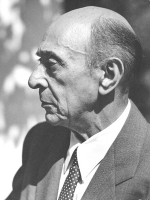A Survivor from Warsaw, op. 46
Testo della parte vocale (nota 1)
| NARRATORE | |
| I cannot remember ev'rything! I must have been unconscious [most] of the time...! I remember only the grandiose moment when they all started to sing, as if prearranged, the old prayer they had neglected for so many years - the forgotten creed! | Non tutto ricordo, troppo a lungo restai privo di sensi. Ho memoria soltanto del momento solenne, quando tutti intonarono il canto, come per un'intesa: l'antica preghiera trascurata per tanti e tant'anni, l'obliato credo! |
| But I have no recollection how I got underground to live in the sewers of Warsaw for so long a time... | Non so più ora come mai finii sotto terra nelle fogne di Varsavia, e per tanto tempo ci vissi. |
| The day began as usual. Reveille when it still was dark. "Get out!" Whether you slept or whether worries kept you awake the whole night. You had been separated from your children, from your wife, from your parents. You dont't know what happened to them... How could you sleep? | Quel giorno fu come al solito: sveglia che era ancora notte, e fuori! che tu abbia dormito o che l'ansia t'abbia impedito il sonno. T'hanno strappato dai tuoi figli, da tua moglie, da tua madre, non sai più nulla di loro: come dormire? |
| The trumpets again. "Get out! The sergeant will be furious!" They came out; some very [slowly], the old ones, the sick ones, some with nervous agility. They fear the sergeant. They hurry as much as they can. In vain! Much too much noise, much too much commotion! And not fast enough! | Di nuovo quel grido: «Fuori! il sergente andrà in bestia!». Quelli escono: adagio alcuni, i vecchi, gl'infermi, altri in fretta nervosa, per tema del sergente, correndo ognuno più che può. Non serve! Troppo fracasso, troppa confusione, e mai abbastanza. |
| The Feldwebel shouts! "Achtung! Stilljestandenl Na wird's mal, oder soli ich mit dem Jewehrkolben nachhlfen? Na jut, wenn ihr's durchaus haben wollt!" | Il Feldwebei grida «Attenzione! Attenti! Bene, ci decidiamo? Oppure devo aiutarvi io con il calcio del fucile? D'accordo; se è proprio quello che volete!». |
| The sergeant and his subordinates hit [everyone]: young or old, [strong or sick], guilty or innocent... It was painful to hear them groaning and moaning. | Le percosse del sergente e dei soldati cadono su tutti: giovani e vecchi, sani e malati, innocenti e colpevoli. Quale angoscia in mezzo a tanti gemiti. |
| I heard it though I had been hit very hard, so hard that I could not help falling down. We all on the [ground] who could not stand up were [then] beaten over the head... | Li sentivo benché avessero colpito anche me, e cosi forte che caddi a terra. Chi di noi non riusci a tenersi in piedi lo colpirono alla testa. |
| I must have been unconscious. The next thing I heard was a soldier saying, "They are all dead!" Where upon the sergeant ordered to do away with us. | Devo aver perso i sensi, finché sentii un soldato che diceva: «Son morti tutti!». Al che il sergente ordinò di portarci via. |
| There I lay aside half conscious. It had become very still - fear and pain. - Then I heard the sergeant shouting, "Abzahlen!" | Io ero là, da parte, semisvenuto. S'era fatto un gran silenzio... paura... dolore. Subito gridò il sergente: "Contateli!" |
| They started slowly, and irregularly: one, two, three, four, "Achtung!" The sergeant shouted again, "Rascher! Nochmal von vorn anfangen! In einer Minute will ich wissen wieviele ich zur Gaskammer abliefere! Abzahlen!" | Cominciarono adagio, senz'ordine: uno, due, tre, quattro. «Attenzione!» urlò di nuovo il sergente: «Più in fretta! Ricominciare da capo! In un minuto voglio sapere quanti devo portare nella camera, a gas! Contarsi!». |
| They began again, first slowly: one, two, three, four, became faster and faster, so fast that it finally sounded like a stampede of wild horses, and [all] of a sudden, in the middle of it, they began singing the SCHeMA YISROeL. | Ricominciarono, prima adagio, uno, due tre, quattro. Poi più presto, più presto, cosi presto che alla fine sembrò un galoppo, cavalli impazziti in fuga. Ed ecco, ad un tratto in mezzo a tutto questo, intonarono in coro lo Scemà Isroel! |
| CORO | |
| Shema Ysroel Adōnoy elōhenoo, Adōnoy eḥod Veohavto es Adōnoy elōheḥo beḥol levoveḥo oovehol nafsheḥho [ooveḥol meōdeḥo] Vehoyoo haddevoreem hoelleh asher onōḥee metsavveḥo hayyōm al levoveḥo Veshinnantom levoneḥo vedibbarto bom [beshivteḥo beveteḥo] ooveleḥteho baddereḥ oove shobeho oovekoomeḥo. | Ascolta, Israele: l'Eterno, l'Iddio nostro è l'unico Eterno. Tu amerai dunque l'Eterno, il tuo Dio con tutto il cuore, con tutta l'anima tua e con tutte le tue forze. E questi comandamenti che oggi ti dò ti staranno nel cuore: li inculcherai ai tuoi figliuoli, ne parlerai quando te ne starai seduto in casa tua, quando sarai per via, quando ti coricherai e quando ti alzerai. |
| (Traduzione di Fedele d'Amico) | |
(1) Testo tratto dal programma di sala del Concerto dell'Accademia Nazionale di Santa Cecilia,
Roma, Auditorio di via della Conciliazione, 18 ottobre 1998
I testi riportati in questa pagina sono tratti, prevalentemente, da programmi di sala di concerti
e sono di proprietà delle Istituzioni o degli Editori riportati in calce alle note.
Ogni successiva diffusione può essere fatta solo previa autorizzazione da richiedere direttamente agli aventi diritto.
Ogni successiva diffusione può essere fatta solo previa autorizzazione da richiedere direttamente agli aventi diritto.
Ultimo aggiornamento 14 gennaio 2015
